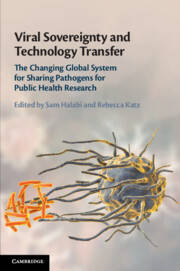 Viral Sovereignty and Technology Transfer
Viral Sovereignty and Technology Transfer Lessons from Latin America and the Caribbean
from Part II - Health Security, Research Ethics, and Human Rights Implications
Published online by Cambridge University Press: 15 May 2020
Chapter 5 analyzes the ethical criteria that governments should apply when transferring samples or related information about biological samples during public health emergencies. What are the ethical rules that should govern biomedical research conducted during a public health emergency, especially when that emergency occurs in a low-resource setting? This chapter analyzes these questions from the perspective of efforts in the Latin American and Caribbean regions, drawing on the relevant statements released by the Pan American Health Organization (PAHO). PAHO has one of the longest-running regional bioethical programs in the world, and has played an important advisory role on the ethics of research during public health emergencies, including the Zika virus in 2015-16.
To save this book to your Kindle, first ensure no-reply@cambridge.org is added to your Approved Personal Document E-mail List under your Personal Document Settings on the Manage Your Content and Devices page of your Amazon account. Then enter the ‘name’ part of your Kindle email address below. Find out more about saving to your Kindle.
Note you can select to save to either the @free.kindle.com or @kindle.com variations. ‘@free.kindle.com’ emails are free but can only be saved to your device when it is connected to wi-fi. ‘@kindle.com’ emails can be delivered even when you are not connected to wi-fi, but note that service fees apply.
Find out more about the Kindle Personal Document Service.
To save content items to your account, please confirm that you agree to abide by our usage policies. If this is the first time you use this feature, you will be asked to authorise Cambridge Core to connect with your account. Find out more about saving content to Dropbox.
To save content items to your account, please confirm that you agree to abide by our usage policies. If this is the first time you use this feature, you will be asked to authorise Cambridge Core to connect with your account. Find out more about saving content to Google Drive.